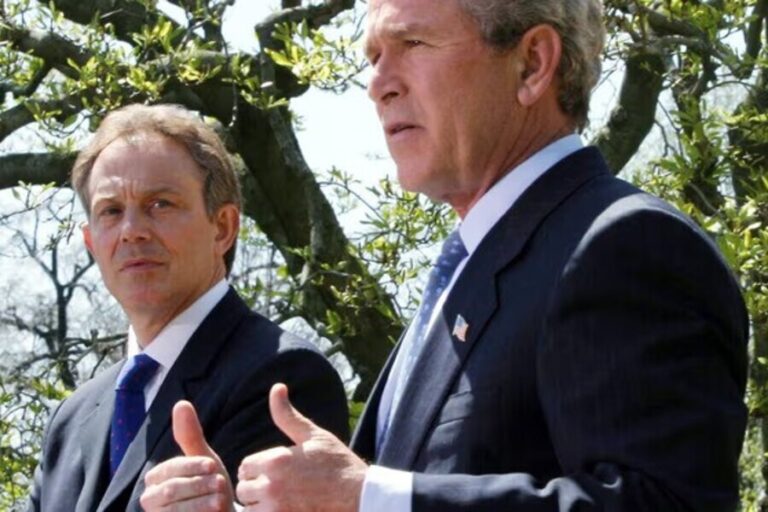Tony Blair’s advisers raised serious concerns about George W. Bush’s approach to the Iraq war, questioning whether the United States maintained adequate political oversight of its military operations. Newly released documents from the UK’s National Archives have revealed a troubling portrait of the dynamics between the two leaders during one of the most turbulent periods of the conflict.
In April 2004, following a brutal U.S. military campaign in the city of Falluja, Richard “Rich” Armitage, then the U.S. deputy secretary of state, conveyed a candid and alarming assessment to Sir David Manning, the UK ambassador to Washington. According to a memo marked “please protect very carefully,” Armitage described Bush as initially insistent on a forceful response to the insurgency, demanding that U.S. forces “kick-ass” in the wake of the mutilation of four American contractors whose bodies were hung from a bridge in Falluja.
Armitage revealed that Bush believed he was on a “mission from God” to confront Iraqi insurgents, a statement that raised alarm within Blair’s administration. Armitage urged Blair to leverage his influence during an upcoming visit to Washington to steer Bush toward a more measured strategy. “Rich summed it all up by saying Bush still thought he was on some sort of mission from God. But recent events had made him ‘rather more sober,’” Manning wrote in his report to Downing Street.
The operation in Falluja, known as Operation Vigilant Resolve, aimed to suppress a violent uprising that threatened to derail efforts to establish an independent Iraqi administration. While U.S. marines engaged in fierce combat, political leaders within the coalition provisional authority cautioned that an overly aggressive military response could undermine long-term stability. Ultimately, Bush reconsidered his initial stance after receiving what Armitage described as a “dose of reality.”
Despite this recalibration, the situation in Falluja exposed deeper concerns about the U.S. approach to the conflict. Blair’s team prepared a briefing ahead of the prime minister’s Washington visit, noting that the events in Falluja had “used up a great deal of the coalition’s political capital.” The document stressed the need for Blair to “deliver some difficult messages” to Bush about ensuring “proper political control of military operations” and adopting a “more measured approach.”
The memo also criticized “clumsy U.S. handling” and “disproportionate military tactics,” warning that the scenes broadcast on Iraqi television appeared to many as collective punishment. Such images, the advisers argued, risked alienating Iraqi civilians and further destabilizing the region.
The documents highlight a growing unease within the Blair government about the trajectory of the Iraq war. Sir Nigel Sheinwald, Blair’s foreign policy adviser, outlined the UK’s concerns, including “apocalyptic media treatment” and the apparent disconnect between military strategy and political objectives. “Too many military officers [are] talking tough to a U.S. audience, with little attention to the effect on an Iraqi or regional audience,” Sheinwald wrote.
Operation Vigilant Resolve resulted in significant casualties. By the time the offensive concluded, 27 U.S. troops had died, and an estimated 200 insurgents and 600 Iraqi civilians were killed. The operation’s failure to fully subdue the insurgency led to a second, even more intense campaign in November 2004, during which coalition forces finally took control of Falluja. These events underscored the challenges of balancing military action with the broader political goal of stabilizing Iraq.
The revelations about Bush’s perceived “mission from God” add a new dimension to the historical understanding of the Iraq war. While the White House has previously dismissed reports that Bush claimed divine guidance for his actions in Iraq and Afghanistan, the documents from the UK archives provide a firsthand account suggesting otherwise. This perspective complicates the narrative of the war and raises questions about the role of personal belief in shaping U.S. policy during a critical period.
The documents also highlight the strain on the U.S.-UK alliance as Blair’s government grappled with the dual challenge of supporting its closest ally while addressing growing domestic and international criticism of the war. For Blair, navigating this delicate balance required not only diplomacy but also a willingness to confront his American counterpart on the strategic direction of the conflict.
In retrospect, the Iraq war remains a contentious chapter in both American and British history. The newly released documents shed light on the behind-the-scenes tensions and the high-stakes decisions that defined this period. As historians and policymakers continue to analyze the lessons of Iraq, these revelations offer a poignant reminder of the complexities and consequences of war.

